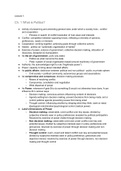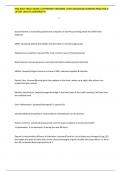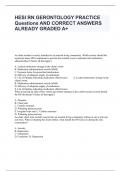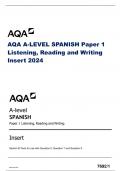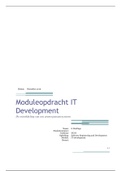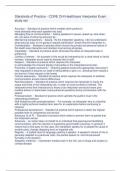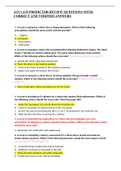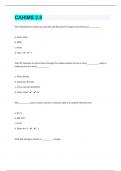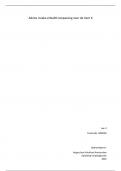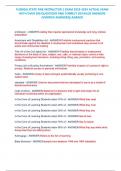Lecture 1:
Ch. 1 What is Politics?
● Activity of preserving and amending general rules under which a society lives - conflict
and cooperation
○ Process or search of conflict resolution of rival views and interests
● Conflict: competition between opposing forces, reflecting a diversity of opinions,
preferences, needs or interests
● Cooperation: working together, achieving goals through collective actions
● Adams: politics as “systematic organisation of hatred”
● Exercise of power, science of government, collective decision making, allocation of
resources, deception & manipulation
● As the art of government: polis (city state)
○ Politics as what concerns the state
○ Polity: system of social organisation based around machinery of government
● Authority: the acknowledged right to rule (“legitimate power”)
● Power: capacity to bring about intended efforts
● As public affairs: distinction between political and non political - public vs private sphere
○ Civil society = political community, autonomous groups and associations
● As compromise and consensus: decision making processes
○ Means of resolving conflict
○ Compromise, conciliation and negotiation
○ Wide dispersal of power
● As Power: whenever A gets B to do something B would not otherwise have done, A can
influence B in various ways:
○ Decision making: conscious actions influencing content of decisions
○ Agenda setting/non decision making: prevent decisions from being made; set or
control political agenda preventing issues from being aired
○ Thought control: influencing another by shaping what they think, want or need;
ideological indoctrination/psychological control (radical power)
● Luke’s Dimensions of Power
○ Decision making: observable, overt conflict over key issues; divided by
subjective interests seen in policy preferences revealed by political participation.
Resolved by exercise of power visible through decision making.
○ Non decision making: observable overt and covert conflict over key and
potential issues; divided by subjective interests seen in policy preferences and
grievances; resolved by exercise of power through decision making and non
decision making
○ Thought control: overt, covert and latent conflict over key and potential issues;
divided by subjective interests seen in policy preference, grievances and
objective interest; resolved by exercise of power through decision, non decision
making and thought control
,Studying politics:
● Philosophical:
○ Normative questions: values and standards of conduct (what should be rather
than what is)
■ Not objective (external views, unbiased and able to give
proof/demonstration)
● Empirical: descriptive
○ Based on observation and experiment: data and experience
● Behaviourism: theories based on observable behavior - quantitative data
● Positivism: social enquiry should adhere to methods of natural sciences
● Rational choice theory
○ Formal political theory
○ Economic theory, self interest & individualis
○ Game theory: exploring problems of conflict/collaboration by explaining how one
actor’s choice of strategy affects others best choice and vv
● New institutionalism: rules, procedure and organisation of government
Critical approaches to politics
- Seeks to challenge the political status quo (often by fronting the interests of
marginalized groups)
- Questions the idea of an objective reality
● Postmodernism: experimental movements in western arts architecture and cultural
development. Shift away from societies structured by industrialisation and class solidarity
to increasingly fragmented and pluralistic information societies
○ Consumerism, individualism, abstract
● Post structuralism: all ideas and concepts are expressed in language which itself is
meshed in complex relations of power - Focault (you can expose hidden meanings in
particular concepts theories and interpretations through deconstruction)
● Post positivism: approach to knowledge that questions the idea of an objective reality
emphasising instead the extent to which people conceive, construct the world in which
they live in
● Feminism: drawing attention to systematic and pervasive structures of gender inequality
characterising politics at every level
● Critical theory: rooted in neo marxism, extended the notion of critique to all social
practices
● Green ideology: challenged anthropocentric emphasis of established political and social
theory, bringing holistic approaches to political and social theory and understanding
● Post colonialism: cultural dimension of colonial rule showing how western cultural and
political hegemony over the rest of the world has been preserved despite the
achievement of formal political independence across almost the entire developing world
,Concepts: general idea about something usually expressed in a single word or short phrase. An
ideal type - mental construct attempting to draw out meaning from an otherwise almost infinitely
complex reality through showing a logical extreme
● Essentially contested concept: a concept about which controversy is so deep that no
settled or neutral definition can ever be developed
Model: theoretical representation of empirical data that aims to advance understanding by
highlighting significant relationships and interactions
Political Process:
● Inputs: demands and support from the general public.
● Outputs: decision and action of governments; policy making, passing laws, taxation,
allocation of public funds etc
Theory: systematic explanation of empirical data usually presented as reliable knowledge
(hypothesis)
Paradigm: pattern or model that highlights relevant features of a particular phenomenon
, Ch.2 Political ideas and ideologies
● Ideology: +/- coherent set of ideas providing a base for organised political action; to
preserve, modify or overthrow and existing power system
○ Offer an account of existing order
○ Provide a model of desired future
○ Outline how political change can and should be brought about
● Rationalism: the world can be understood through human reason
● Pragmatism: importance of practical circumstances and goals (anti abstract)
● Liberalism: ideology of industrialised west
○ Meta ideology (higher/second order ideology that lays grounds for an ideological
debate)
○ Early 19th century
○ Aspirations of rising industrial middle class, closely linked to capitalism
○ Locke: anti absolutism. Pro constitution and representative government with
minimum government intervention in economics (laissez faire approach and
privatisation)
○ Core principles of liberalism: individualism; individual freedom & liberty; equality
under law; reason in a rational structure and the capacity of progress towards
equality; meritocracy (reward talent); consent; constitutionalism
● Classical liberalism: extreme individualism - atomism
● Economic liberalism: belief in the market aas a self regulating mechanism to naturally
deliver general prosperity and opportunities
● Modern liberalism: more sympathetic to state interventions - “big government” of
economic management and social regulation
● Conservatism: late 18th century
Ch. 1 What is Politics?
● Activity of preserving and amending general rules under which a society lives - conflict
and cooperation
○ Process or search of conflict resolution of rival views and interests
● Conflict: competition between opposing forces, reflecting a diversity of opinions,
preferences, needs or interests
● Cooperation: working together, achieving goals through collective actions
● Adams: politics as “systematic organisation of hatred”
● Exercise of power, science of government, collective decision making, allocation of
resources, deception & manipulation
● As the art of government: polis (city state)
○ Politics as what concerns the state
○ Polity: system of social organisation based around machinery of government
● Authority: the acknowledged right to rule (“legitimate power”)
● Power: capacity to bring about intended efforts
● As public affairs: distinction between political and non political - public vs private sphere
○ Civil society = political community, autonomous groups and associations
● As compromise and consensus: decision making processes
○ Means of resolving conflict
○ Compromise, conciliation and negotiation
○ Wide dispersal of power
● As Power: whenever A gets B to do something B would not otherwise have done, A can
influence B in various ways:
○ Decision making: conscious actions influencing content of decisions
○ Agenda setting/non decision making: prevent decisions from being made; set or
control political agenda preventing issues from being aired
○ Thought control: influencing another by shaping what they think, want or need;
ideological indoctrination/psychological control (radical power)
● Luke’s Dimensions of Power
○ Decision making: observable, overt conflict over key issues; divided by
subjective interests seen in policy preferences revealed by political participation.
Resolved by exercise of power visible through decision making.
○ Non decision making: observable overt and covert conflict over key and
potential issues; divided by subjective interests seen in policy preferences and
grievances; resolved by exercise of power through decision making and non
decision making
○ Thought control: overt, covert and latent conflict over key and potential issues;
divided by subjective interests seen in policy preference, grievances and
objective interest; resolved by exercise of power through decision, non decision
making and thought control
,Studying politics:
● Philosophical:
○ Normative questions: values and standards of conduct (what should be rather
than what is)
■ Not objective (external views, unbiased and able to give
proof/demonstration)
● Empirical: descriptive
○ Based on observation and experiment: data and experience
● Behaviourism: theories based on observable behavior - quantitative data
● Positivism: social enquiry should adhere to methods of natural sciences
● Rational choice theory
○ Formal political theory
○ Economic theory, self interest & individualis
○ Game theory: exploring problems of conflict/collaboration by explaining how one
actor’s choice of strategy affects others best choice and vv
● New institutionalism: rules, procedure and organisation of government
Critical approaches to politics
- Seeks to challenge the political status quo (often by fronting the interests of
marginalized groups)
- Questions the idea of an objective reality
● Postmodernism: experimental movements in western arts architecture and cultural
development. Shift away from societies structured by industrialisation and class solidarity
to increasingly fragmented and pluralistic information societies
○ Consumerism, individualism, abstract
● Post structuralism: all ideas and concepts are expressed in language which itself is
meshed in complex relations of power - Focault (you can expose hidden meanings in
particular concepts theories and interpretations through deconstruction)
● Post positivism: approach to knowledge that questions the idea of an objective reality
emphasising instead the extent to which people conceive, construct the world in which
they live in
● Feminism: drawing attention to systematic and pervasive structures of gender inequality
characterising politics at every level
● Critical theory: rooted in neo marxism, extended the notion of critique to all social
practices
● Green ideology: challenged anthropocentric emphasis of established political and social
theory, bringing holistic approaches to political and social theory and understanding
● Post colonialism: cultural dimension of colonial rule showing how western cultural and
political hegemony over the rest of the world has been preserved despite the
achievement of formal political independence across almost the entire developing world
,Concepts: general idea about something usually expressed in a single word or short phrase. An
ideal type - mental construct attempting to draw out meaning from an otherwise almost infinitely
complex reality through showing a logical extreme
● Essentially contested concept: a concept about which controversy is so deep that no
settled or neutral definition can ever be developed
Model: theoretical representation of empirical data that aims to advance understanding by
highlighting significant relationships and interactions
Political Process:
● Inputs: demands and support from the general public.
● Outputs: decision and action of governments; policy making, passing laws, taxation,
allocation of public funds etc
Theory: systematic explanation of empirical data usually presented as reliable knowledge
(hypothesis)
Paradigm: pattern or model that highlights relevant features of a particular phenomenon
, Ch.2 Political ideas and ideologies
● Ideology: +/- coherent set of ideas providing a base for organised political action; to
preserve, modify or overthrow and existing power system
○ Offer an account of existing order
○ Provide a model of desired future
○ Outline how political change can and should be brought about
● Rationalism: the world can be understood through human reason
● Pragmatism: importance of practical circumstances and goals (anti abstract)
● Liberalism: ideology of industrialised west
○ Meta ideology (higher/second order ideology that lays grounds for an ideological
debate)
○ Early 19th century
○ Aspirations of rising industrial middle class, closely linked to capitalism
○ Locke: anti absolutism. Pro constitution and representative government with
minimum government intervention in economics (laissez faire approach and
privatisation)
○ Core principles of liberalism: individualism; individual freedom & liberty; equality
under law; reason in a rational structure and the capacity of progress towards
equality; meritocracy (reward talent); consent; constitutionalism
● Classical liberalism: extreme individualism - atomism
● Economic liberalism: belief in the market aas a self regulating mechanism to naturally
deliver general prosperity and opportunities
● Modern liberalism: more sympathetic to state interventions - “big government” of
economic management and social regulation
● Conservatism: late 18th century


